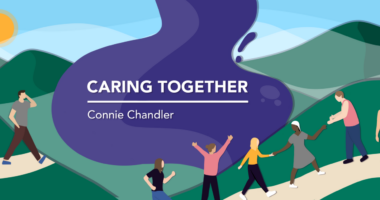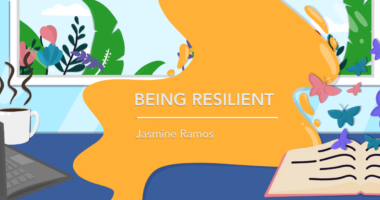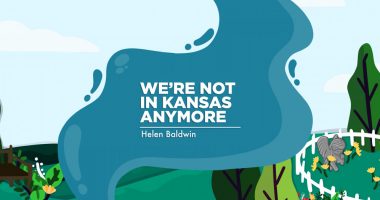Your kind of healthy: Defining wellness on your terms with SMA
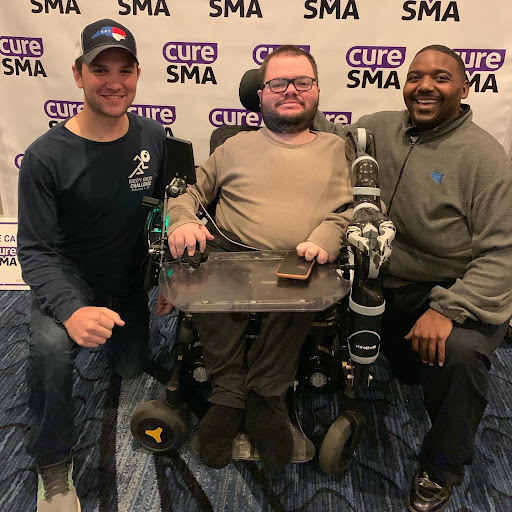
Kevin takes a photo with his brother, Brian, left, and caregiver, Randy, right. (Photo courtesy of Kevin Schaefer)
Over my three decades with spinal muscular atrophy (SMA), I’ve learned the importance of living well with my disability, rather than actively fighting against it. Many people have called me a warrior or an inspiration for facing various obstacles, but the reality is that I manage because I’ve never known anything other than life with SMA.
When I received my SMA diagnosis in 1995, I was a toddler. It wasn’t life-altering for me like it was for my parents, as my life was just beginning. I became a wheelchair user at the same age other kids were learning to walk. Hospital visits and physical therapy appointments were regular components of my childhood and adolescence. I lived my life as anyone else would, not comprehending the full scope of SMA and its effects on my physical development.
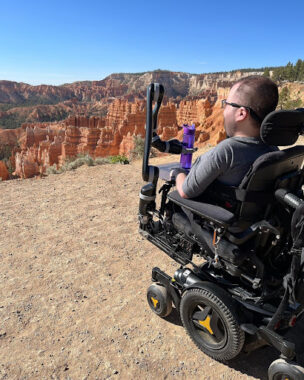
Kevin views an overlook at Bryce Canyon National Park in Utah. (Photo courtesy of Kevin Schaefer)
As time progressed, I faced the harsh reality of SMA as a degenerative disease. When I was a sophomore in high school, my arm and upper body strength started to deteriorate rapidly. Eventually, I could no longer lift my arms to feed myself. This, combined with a severe case of pneumonia during the winter of that year, took a toll on me physically, mentally, and emotionally.
I experienced many highs and lows throughout the rest of high school and into my college years. Thankfully, after throat surgery in 2011, my lung function improved significantly and I began to breathe and sleep better. I was healthier in certain areas, but I was still wrestling with the effects of my declining arm strength and the ways it limited my independence.
Through these experiences and becoming more connected with others in the SMA community, I began to understand that learning to live well with SMA is not a linear process — and it is not based on a conventional definition of what it means to be healthy. It requires constant adaptation and assessment of one’s own needs.
I’ve learned this through experiences with caregivers, acquiring assistive technology, dealing with health issues, and navigating my working life. In each of these scenarios, there was no designated roadmap for me to follow. I had to adapt as I went along, adjust my thinking and expectations as needed, and get guidance from others who were like me.
 Find an SMA specialist near you
Find an SMA specialist near you
The importance of community
Reflecting on my life with SMA, I am immensely grateful for the relationships I’ve built with others in my community. Countless SMA individuals have mentored me, supported me, and shared their lives with me. Through the bonds we’ve formed, we’ve learned together how to live well and lift each other amid adversity.
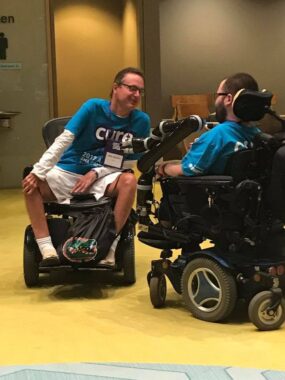
Kevin, right, talks with friend and mentor Mike Blakey. (Photo courtesy of Kevin Schaefer)
I met Mike Blakey at an SMA conference in 2017, and we formed an instant connection. He’s more than two decades older than me, and I see him as a friend and mentor. We talk regularly on the phone, discussing topics ranging from books and movies to our physical and mental health. Our openness with each other helps us share tips and provide support during difficult times.
Mike is someone who enjoys life as much as possible. He swims daily, is an avid reader, goes to sporting events and concerts, and travels frequently. He has a close friendship with his longtime caregiver, Kelly, and they emphasize the importance of caring for each other. In no way is he ignorant of the hardships that come with SMA, but he prioritizes his health through a holistic approach.
When I asked Mike about embracing wellness, he said the key factor for him is “balance and mindfulness. For me, wellness means being mindful of your health (what you eat, how much you sleep, etc.) and maximizing what your body allows.”
Allie Williams and I connected through social media a few years ago and eventually met in person at an SMA conference. She too has a decade-long relationship with her primary caregiver Donna Waldrop. Avid gamers, they met through the popular role-playing game World of Warcraft. They now live and travel together, and they’ve maintained a vibrant friendship all these years.
For Allie, having a routine and sticking to it is one of her strategies for managing SMA.
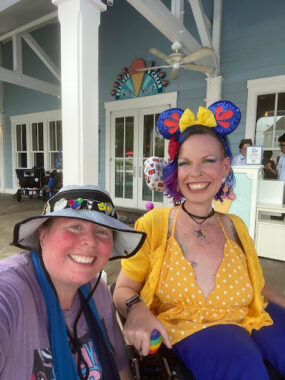
Donna Waldrop, left, with friend Allie Williams met through the popular role-playing game World of Warcraft. (Photo courtesy of Allie Williams)
“It helps to be able to get up at the same time every day and do some things the same every day,” she said. “Also, just sometimes doing the minimum when I feel like I can’t do anything else, like washing my face at the very least in the morning, helps me stay in a healthy mindset. And, for me, mindset is everything.”
When it comes to their relationship, Allie and Donna emphasize the importance of supporting each other and recognizing each other’s emotions and needs. They both benefit from therapy, and make sure to do things together as friends separate from caregiving, including continuing to game together.
Donna encourages other caregivers to remember to take care of themselves.
“It’s OK to cry and be frustrated even if you love what you do and care very much about the person you care for,” she said. “It’s OK to ask for help even though most of us would rather just do it ourselves. Make sure you don’t lose yourself in taking care of someone else, remember the things you like and your hobbies and even limitations, and pay attention to giving yourself what you need when you need it.”
Pursuing joy in moments of struggle
While Mike, Allie, and I have years of experience living with SMA and vast support systems, it’s important to remember that we all struggle. There are days when I feel overwhelmed by fatigue, stress, and the frustration that comes with constantly having to rely on other people for my needs. Sometimes I would rather curl up in bed and avoid the realities of my disability. It’s OK to express one’s emotions and not be positive all the time. I certainly have times when I allow myself to sit with my frustrations and recognize the hardships I’m facing.
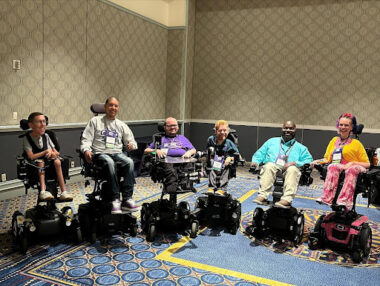
From far left: Shane Burcaw, Jose Flores, Kevin Schaefer, Kevan Chandler, LaMondre Pough, and Allie Williams take part in the 2023 Cure SMA conference in Orlando, Florida. (Photo courtesy of Kevin Schaefer)
Yet the key for me is to keep going, and focus on what is right for me. When I’m at a low point, I remind myself that things will improve, and I turn to others for emotional support. I think about what brings me joy, from books and movies to cherished time with family and friends. Even listening to my favorite music often lifts my spirits. Making the conscious effort to pursue joy gives me motivation. And by implementing a series of practical strategies, I can tackle one obstacle at a time.
Here are some tips for embracing wellness and creating your version of healthy:
Be mindful. Living with SMA requires you to pay close attention to your health. Everyone’s needs are different. Be conscious of what yours are and figure out a medical plan and daily routine with your doctors that works for you. Think about what foods you’re eating, how much water you’re drinking, how well you’re sleeping, and if you’re getting some level of physical therapy or exercise. Then there are SMA-specific issues like lung function and range of motion.
Put together a strong support team. Knowing you have people you can count on can greatly impact your quality of life. Caregivers, family members, friends, coworkers, and anyone else who has a positive impact on you can provide practical and emotional support. Likewise, you can support them as well.
Balance your energy levels. As people with SMA, we only have so much energy daily — and for each of us, it is different. Remember to pace yourself and take breaks when needed. Even if it’s just resting in your wheelchair every few hours, do what you need to maintain your energy levels and balance productivity with rest.
Do things you are passionate about. While SMA comes with many challenges, there is so much you can still do. Whether it’s a vocation, a creative enterprise, or simply a hobby, pursue your passions. If you encounter physical obstacles in the process, look for assistive technologies that might help you. SMA individuals tend to adapt well and find creative solutions.
Connect with others in the SMA community. There’s nothing like building relationships with people who understand exactly what you are going through daily. Even if you don’t live near anyone with SMA, there are plenty of online resources to help you make these connections. Utilize social media, video chats, and online forums. You may seek out dozens of community members, or you may prefer a close connection with one or two people. Whatever way you do it, the relationships you forge could play an integral role in your life and well-being.
SMA News Today is strictly a news and information website about the disease. It does not provide medical advice, diagnosis, or treatment. This content is not intended to be a substitute for professional medical advice, diagnosis, or treatment. Always seek the advice of your physician or other qualified health provider with any questions you may have regarding a medical condition. Never disregard professional medical advice or delay in seeking it because of something you have read on this website.
Recent Posts
Related articles





